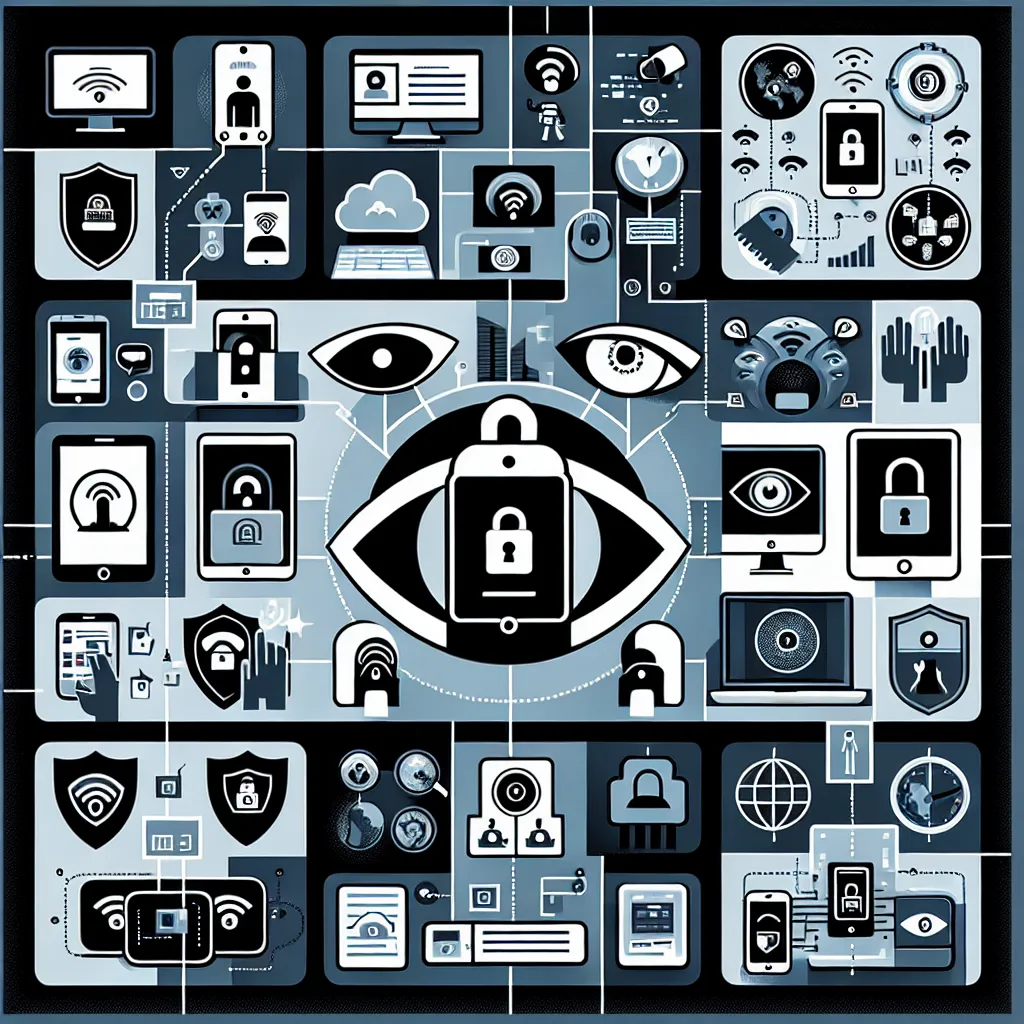Digital surveillance has become a pressing concern in our increasingly connected world. As an IELTS Writing Task 2 expert, I’ve noticed a growing trend of questions related to this topic. In fact, based on recent exam patterns, there’s a high probability that you might encounter a question about managing digital surveillance risks in your upcoming IELTS test. Let’s explore this theme through a sample question and two model essays tailored for different band scores.
Analyzing the Topic
Before we dive into the sample essays, it’s crucial to understand the complexity of digital surveillance. This topic intersects with privacy rights, technological advancements, and government policies. It’s a multifaceted issue that requires a balanced approach in your writing.
 Digital Surveillance Risks
Digital Surveillance Risks
Sample Question and Analysis
Let’s consider the following IELTS Writing Task 2 question:
In the digital age, governments and corporations have increasing access to personal data through surveillance technologies. Some people believe this improves public safety and business efficiency, while others are concerned about privacy violations. Discuss both views and give your own opinion.
This question requires you to:
- Discuss the benefits of digital surveillance (improved public safety and business efficiency)
- Address concerns about privacy violations
- Present your own opinion on the matter
Remember to maintain a balanced approach while clearly stating your position.
Model Essay for Band 8-9
Here’s a high-scoring sample essay addressing the given question:
In the era of rapid technological advancement, the proliferation of digital surveillance has sparked a heated debate. While proponents argue that it enhances public safety and business efficiency, critics express grave concerns about potential privacy infringements. This essay will examine both perspectives before presenting my own viewpoint.
Advocates of digital surveillance emphasize its role in bolstering security and optimizing business operations. Government agencies can leverage surveillance technologies to prevent and solve crimes more effectively, potentially leading to safer communities. Similarly, corporations can utilize data collected through surveillance to streamline their processes, tailor products to consumer needs, and ultimately improve customer satisfaction. For instance, smart city initiatives often incorporate extensive surveillance systems to manage traffic flow and respond swiftly to emergencies.
On the other hand, opponents of widespread digital surveillance highlight the significant risks to individual privacy. The collection and storage of vast amounts of personal data create opportunities for misuse, whether through data breaches, unauthorized access, or overzealous government monitoring. This constant scrutiny can lead to a chilling effect on free speech and personal expression, as individuals become wary of potential repercussions for their online activities. Moreover, there are concerns about the potential for discriminatory practices based on the analysis of personal data.
In my opinion, while the benefits of digital surveillance are undeniable, they do not outweigh the fundamental right to privacy. I believe that strict regulations and transparent oversight mechanisms are essential to strike a balance between security and individual freedoms. Governments and corporations should be held accountable for their data collection practices, with clear limitations on what information can be gathered and how it can be used. Additionally, individuals should be empowered with tools and knowledge to protect their digital privacy.
In conclusion, the issue of digital surveillance presents a complex challenge for modern societies. While it offers tangible benefits in terms of safety and efficiency, the potential for abuse and erosion of privacy rights cannot be ignored. Moving forward, it is crucial to develop comprehensive frameworks that harness the positive aspects of surveillance technologies while robustly safeguarding individual privacy.
(Word count: 329)
Model Essay for Band 6-7
Here’s a sample essay targeting a Band 6-7 score:
In today’s digital world, governments and businesses can access a lot of personal information through surveillance technology. Some people think this is good for public safety and business efficiency, while others worry about privacy. This essay will discuss both sides and give my opinion.
There are some benefits to digital surveillance. Governments can use it to catch criminals and prevent terrorist attacks, which makes society safer. For example, CCTV cameras in public places can help police solve crimes. Businesses can also use data from surveillance to improve their services and make more money. They can understand what customers want and make better products.
However, there are also problems with too much surveillance. People’s privacy might be at risk if their personal information is collected and stored. This data could be stolen by hackers or misused by the government. Some people feel uncomfortable knowing they are always being watched. This might make them change their behavior or stop expressing their opinions freely.
In my view, while digital surveillance can be useful, we need to be careful about how it’s used. I think there should be strict rules about what information can be collected and how it can be used. People should also know more about how to protect their privacy online. We need to find a balance between safety and privacy rights.
To conclude, digital surveillance has both good and bad points. It can help make us safer and improve businesses, but it also risks our privacy. We need to use this technology carefully and make sure people’s rights are protected.
(Word count: 263)
Key Writing Tips
When tackling this topic in IELTS Writing Task 2, keep these points in mind:
- Structure: Ensure a clear introduction, body paragraphs discussing both viewpoints, and a conclusion with your opinion.
- Vocabulary: Use topic-specific vocabulary related to digital surveillance and privacy.
- Grammar: Employ a mix of simple and complex sentence structures.
- Cohesion: Use linking words to connect ideas smoothly.
- Examples: Provide relevant examples to support your arguments.
Vocabulary and Grammar Notes
For a Band 8-9 essay:
- Use sophisticated vocabulary like “proliferation,” “bolstering,” “streamline,” “chilling effect”
- Employ complex sentence structures and advanced cohesive devices
For a Band 6-7 essay:
- Use simpler vocabulary while still maintaining topic relevance
- Focus on clear, error-free sentences with some variation in structure
Essential Vocabulary
Here are some key terms related to digital surveillance:
- Surveillance (noun) /səˈveɪ.ləns/ – the careful watching of a person or place
- Privacy (noun) /ˈprɪv.ə.si/ – the state of being free from public attention
- Data breach (noun) /ˈdeɪtə briːtʃ/ – an incident where information is stolen or taken from a system
- Cybersecurity (noun) /ˌsaɪ.bəˈsekjʊə.rɪ.ti/ – the state of being protected against criminal or unauthorized use of electronic data
- Encryption (noun) /ɪnˈkrɪp.ʃən/ – the process of converting information into a code to prevent unauthorized access
- Biometrics (noun) /ˌbaɪ.əˈmet.rɪks/ – the measurement and analysis of unique physical characteristics
- GDPR (acronym) /ˌdʒiː.diː.piːˈɑːr/ – General Data Protection Regulation, a law on data protection in the EU
- Anonymity (noun) /ˌæn.əˈnɪm.ə.ti/ – the state of not being identified by name
- Metadata (noun) /ˈmet.ə.deɪ.tə/ – a set of data that describes and gives information about other data
- VPN (acronym) /ˌviː.piːˈen/ – Virtual Private Network, a service that hides your internet activity
Conclusion
Mastering the topic of digital surveillance risks is crucial for success in IELTS Writing Task 2. By understanding the key issues, using appropriate vocabulary, and structuring your essay effectively, you can tackle questions on this subject with confidence. Remember to practice writing essays on similar topics, such as:
- The impact of social media on personal privacy
- The role of artificial intelligence in digital surveillance
- Balancing national security with individual privacy rights
We encourage you to write your own essay based on the sample question provided and share it in the comments section. This practice will help you refine your writing skills and prepare effectively for your IELTS exam.


